Photographs: Sreeram Selvaraj Shobha Warrier in Chennai
It was an event for budding entrepreneurs to showcase their Innovative Socio-Business Projects at IIT Madras organised by Genesis, a joint initiative of the Siva group (a $3-billion global conglomerate) and C-Tides (Cell for Technology Innovation, Development and Entrepreneurship Support), IIT Madras.
With a total prize money of Rs 4 lakh (Rs 400,000) and a potential seed funding from angel investors, venture capitalists and entrepreneurs who will be judging the commercial feasibility of projects, it was an event that was widely participated in by young budding entrepreneurs.
The winners of Genesis last year was Team Amrita Healthcare, comprising students from Stanley Medical College Chennai and NITK Surathkal.
They have established a company NewDigm Healthcare Technologies Pvt. Ltd. with the motto of 'Health for all'.
The winner of Genesis 2011 (Rs 240,000) is Aquaregia developed by the students of IIT Madras that can not only provide clean purified water at 25 paise per litre but also create entrepreneurs in every street in villages.
The winning Team from IIT Madras has five members -- Vinay Sridhar, Lohit Vankina, Vishruth Srinath, Arun Chandran and Ananth Jain.
Inspiration
After attending a course on entrepreneurship at IIT Madras, Vinay -- one of the three founders and who represented the team -- said he was inspired to be an entrepreneur and not work for any company after his studies.
Vinay continued, "We met a lot of entrepreneurs while doing the course. The kind of impact their ventures had on people and society made me realise that I also wanted to be an entrepreneur. Entrepreneurship is about creating a change. Whether it is in rural India or urban India, it doesn't matter. I want India to be a better place. Aquaregia is one way by which a change can be made, I feel."
What is Aquaregia?
Aqua regia in Latin means royal water; so called because it is used to describe a mixture of nitric and hydrochloric acids that can dissolve gold and platinum.
Vinay adds, "We feel water is as precious as gold and platinum. When we realised that 60 per cent of rural India does not have good drinking water, we thought we had to tackle the problem."
Three of them led by Vinay started their research on the project eight months ago. They also spoke to a range of people and found that the problem did not lie in the kind of purification devices that were there in the market.
. . .
Budding entrepreneurs! Clean drinking water for all
Image: Vinay Shridhar.Photographs: Sreeram Selvaraj
"We found that it is the cost that is a deterrent in rural areas. Even if you bring down the cost from Rs 3,000 to Rs 1,500, rural India does not have that kind of money to buy purifiers."
They then decided that the device they would develop should not run on electricity, and it should be durable and portable.
Aquaregia has two tanks one top of another and four purification bulbs in between. The unpurified water is poured into the top tank and it passes through the bulb which is a combination of sand, saw dust, nano silver particles, etc, and gets purified.
This has the capacity to purify water of all the impurities that you find in ground water. They plan to use the customised bulb made by Tata to purify water.
They have identified that in the first year of starting the venture, they may require Rs 10-20 lakh (Rs 1-2 million). They plan to use Rs 10 lakh for prototyping and another Rs 10 lakh for marketing.
"The first prototype may cost Rs 5,000. That is why we have kept aside Rs 10 lakh for prototyping. Then, we have to make the villagers understand that the water that they drink is not purified," the team said.
Creating a change in a village
WHO says a person needs an average of 3 litres of water everyday. That is why they decided to have the product in three sizes of 50 litres, 100 litres and 150 litres capacity.
They plan to sell it not to every villager but to one person in a street. He in turn can sell water to the others in the street. In other words, he becomes the local entrepreneur. By this way, they plan not only to bring clean drinking water to rural India but also create entrepreneurs in every street of a village.
"We plan to encourage micro enterprises in the villages. So, we plan to have an entrepreneur in every street. We want to make use of the networks of NGOs to reach out to people. At present, the other two founders are in a village in Vellore district to study the exact requirements of the villagers," Vinay explained.
Aquaregia also has plans to collaborate with banks and through micro financing, they want to help the village entrepreneur to take a loan to buy the product.
The three states they are looking at are Tamil Nadu, Andhra Pradesh and Karnataka.
Dream as an entrepreneur
Vinay says the team has only realistic dreams. "We want each street in every village in south India to have our product so that they can get clean drinking water. That way, we can get rid of all the diseases that come with contaminated water. We are not looking at the financial gains as none of us dream of a lavish lifestyle in mansions. We want to be entrepreneurs who can make an impact in society."
. . .
We the Children to bridge inequality
Image: Shreya MishraPhotographs: Sreeram Selvaraj Shobha Warrier
Shreya Mishra, a final year student from IIT Bombay, was at IIT Madras with her socio-business project 'We the Children'.
The idea was born after former President A P J Abdul Kalam came to IIT-Bombay and spoke about the inequality that is there among students and also the quality of education.
After that, two of her friends from IIT Bombay and one from IIT Kanpur sat down that night discussing what Dr Kalam had said, and about how they could help bridge the gap. There was this desire to do something for society.
"It was an idea of passion. We thought if we don't start doing it now, it will never happen. It was high time, I felt. So, we launched a campaign in Bhopal -- which is my home town -- to solve the educational inequity," Shreya said.
The campaign was to mobilise students of private and public schools to solve the problems of under-resourced students of government corporation schools.
In October 2010, Shreya and her friends could energise students and teachers of ten privileged schools with their presentation.
"We convinced the principals that their students had the power to make the difference. There are 40 million students in private schools and if they can spend 2 hours every week during their SUPW (Socially Useful and Productive Work) periods, we are talking about huge man power. We felt this can be utilised effectively. We told the school authorities that it was not just social work; it would empower and sensitise the students too," Shreya said.
The students identified many problems that the underprivileged children face in their schools and came out with solutions. One of the best ideas that 'We the Children' got was the need to use teaching aids to students of the 3-5 age group. And, it made a huge difference in the way they imbibed the concepts!
Revenue model
The revenue model is a monthly magazine for private school students to collect funds for the campaigns. 250 school libraries subscribe to the magazine all over India and 500 students subscribe to it in Bhopal.
Shreya's target is to get at least 5,000 subscribers for the magazine so that they can run the campaign in five cities in India in the next three years.
Other than corporate funding from Educom Solutions, the students themselves came with ideas to raise funds in Bhopal.
Future plans
Today, 'We the Children' has a huge team of 30 students from IIT Bombay, IIT Kanpur, BITS Pilani, National Law School, MIT, etc.
"All of us are quite enthusiastic about taking this forward. The pattern that we have thought of is, some of us will take up jobs so that we could help We the Children with funds. Once it grows, at least the ten of us will be full time with We the Children to take it forward."
. . .
Edumile to help students
Image: Hari Kishore and Srinivasa Raju Namburi.Photographs: Sreeram Selvaraj Shobha Warrier
One of the top short-listed projects at the Genesis was Edumile by a team consisting of students and working professionals.
The competition was to identify budding entrepreneurs who can showcase Innovative Socio-Business Projects.
The students are mainly based in the United States, they are doing their MS and MBA at prestigious universities like Harvard, Stanford, Berkley, etc.
The working professionals are Hari Kishore and Srinivasa Raju Namburi. The other student founders are Satish Polisetti, Uzma Hussain Barilashar, Vijay Kalangi and Mayur Patnala. The average age of the team is 25.
Edumile was one of the finalists and in the top ten in the Global Social Venture Competition at Berkeley.
Inspiration
The inspiration to start Edumile is its own story. The school friends came together with this idea because all of them suffered because they came from small places with no help from anyone. All of them took loans from somewhere and paid huge interest. "We know it is not just our problem, but everybody's problem."
Edumile is designed to give education and guidance to rural students of India who do not have access to good higher education and also guidance.
"The dropout percentage is 88 in the rural areas for higher education. We have identified a few reasons and one is monetary and the second is, they have none to guide them properly. I am an example of that," Srinivasa Raju says.
Srinivasa Raju is the son of a bus conductor in a small village in Andhra Pradesh. He didn't know which colleges are good and which courses are better. Hari Kishore studied at BITS, Pilani when his family had no money to even buy grocery for home. Satish is today studying at Berkeley but he had to undergo the same difficulties to complete his school and engineering education in India.
"All of us took bank loans and other loans for our education and even the banks charge as high as 14%. So, we know it is not a problem faced by just us, but many, many students like us. We at Edumile wanted to bridge all the gaps - monetary, mentoring, in education and help them in employment."
The pilot projects of 18 months will start in Hyderabad and Kolkata by the year end. It will be in collaboration with local NGOs who help them identify poor students who need financial help as well as filling the information gap. Initially, Edumile plans to target 1200 students.
Edumile is not going to work on a donation-based program; they call it micro-lending.
"We loan the money. If someone is interested in giving loan to a student, he can go to the Edumile website which has the profiles of all the students who need help. He can choose the student and give him a loan. It won't end there; he can be the student's mentor too. So, how we function is, Edumile acts as intermediary between students and lenders and mentors. Unlike micro finance organisations, it is individuals from all over the world who would be lending money. So, students need not pay a higher interest rate of 25 per cent or so. Here, we take only 1-2 per cent for the operational needs of Edumile for sustainability."
To remain sustainable, Edumile has identified campus managers across India in very good institutions. The campus managers contact the alumni of the institutions so that they can be lenders. "If every college has an interface where alumni can be in touch with those who need help, we can transform the scene."
Future plans
It is not lending money to many students that is the ultimate dream of the Team Edumile.
"We want to create social consciousness. For example, when a guy with the help of somebody come out of a village, studies and finally gets a job, he will in turn help another student. That way, we want many, many young people to help the needy."
. . .
Biofuels as future fuels
Image: Genesis 2011 runners-up.Photographs: Sreeram Selvaraj Shobha Warrier
The Genesis 2011 winner was Aquaregia by IIT Madras. The runner up is from IIIT DM (Indian Institute of Information Technology, Design and Manufacturing), Kancheepuram, an institution incubated by IIT Madras campus.
The project by Kunal Bhambhani and Swagat Sharma is Biofuels As Future Fuels (BAFF).
Inspiration
The inspiration behind BAFF was the amount of waste Kunal and Swagat noticed all over the cities in India. They also noticed that a large chunk of it consisted of kitchen waste.
"We were aware of the gobar gas projects and many such projects initiated by the government of India in the rural areas but we found that there is nothing of that sort in the urban areas," the team said.
But what really inspired them was ARTI, an Ashden award winner in Pune that uses waste from kitchen to run a biogas plant and not use it as manure. "Our idea is to use this idea for urban India. But our idea is a step ahead of what they are doing. What we want to produce is bottled biogas fuel."
Their idea would have two good effects in the society; one, cities will be cleared of kitchen waste as they plan to collect kitchen waste from all over - from vegetable markets, hotels and residential areas. Second is, they plan to use the gas in a compressed form as a substitute for LPG cylinder.
As the duo want to start a manufacturing unit of household gas cylinders that has the compression technology, the initial capital needed is going to be more than what is needed for many other start ups.
For the pilot project, they have found angel investors who are ready to fund Rs. 15 lakh (Rs 1.5 million) initially and another Rs 45 lakh (Rs 4.5 million) to market the product. "There is no point in building a prototype as it is not a small machine. So, we plan to have an experimental set up and then go for a proper investment of Rs. 2 crore (Rs 20 million) and start manufacturing compressed gas," they say.
. . .
Biofuels as future fuels
Image: Kunal Bhambhani and Swagat Sharma.Photographs: Sreeram Selvaraj
Both have no plans to sell the idea to anyone but start a manufacturing plant. "It's our idea and both of us are motivated to make this a reality. We are technologists but we do not want to be just technologists but also entrepreneurs."
Not just entrepreneurs, they want to be known as social entrepreneurs. "The idea behind the idea is to bring about a positive change. Here, we are getting rid of the waste and at the same time creating energy that is renewable. ours is a green product."
The gas produced from vegetable waste is going to be priced Rs 100 less than the existing price of the gas cylinders.
Both say that it will take quite some time for their dream to come true. "We do not want to restrict ourselves to just biogas alone. We want to produce many more green products. Biogas is only one of them."
"We know that biofuel and biodiesel also have potential. That is why we have named our product, BAFF (Biofuel as Future Fuel). We want to see the logo of BAFF all over India like that of Indian Oil. . . That is our dream."

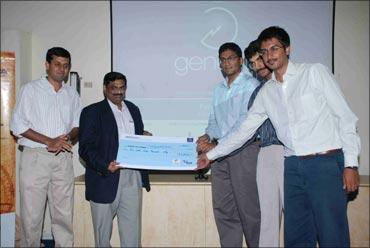
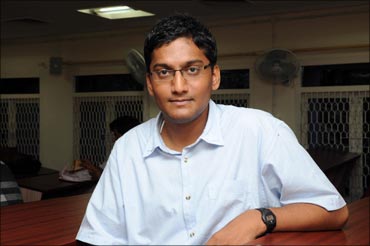
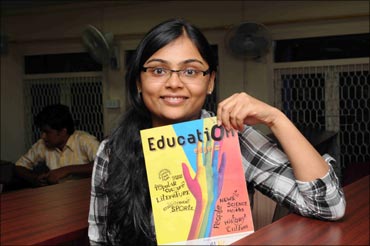

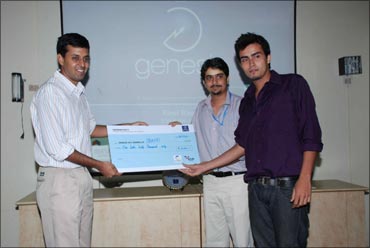
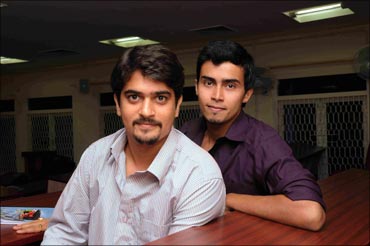
article